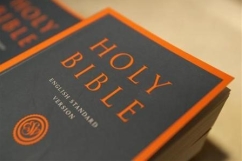
In a post-Christendom culture, should Christians look different from those around them and keep their distance, or engage with culture and not look too distinctive? This has been a challenge for the Church down the ages, but it has a particular edge to it in times of cultural change, particularly when it feels as though culture is moving away from 'Christian values'. And there are compelling arguments on both sides of the debate, for both practical and theological reasons.
From a practical point of view, it doesn't help the Church to look strange to those outside. A few years ago, I knew of a church who wanted to do some building work because the congregation had outgrown their existing building. There was local opposition, not least because it meant moving some graves, and this was not helped by a lack of trust. "It looks like some weird American sect" one person said, even though there was nothing very unusual about it as a charismatic evangelical church – but it was enough mistrust to prevent agreement. There's also an important missional issue here. Where church culture is very different from the culture around it, this creates a 'cultural threshold' which people have to cross over before they can explore faith. Why put such unnecessary barriers in people's way?
To each of these there is a counter argument. If the culture of the church is no different from society, what is the point of joining? Many are aware of the failures of contemporary culture – relationship breakdown, increasing loneliness, growing inequality and the shallowness of valueing everything by how much it costs. Offering something radically different can be very attractive and draw those who are searching for answers.
These questions are nothing new, and the early church faced the same sorts of issues as we do. Keep your distance, and risk misunderstanding? Or keep engaged, and risk compromise and contamination? So it is instructive to look at the language about boundaries and 'outsiders' in the New Testament. In the later letters, we find both kinds of answer.
In his letters to Timothy near the end of his life, Paul seems very concerned to encourage positive engagement with the surrounding culture. We should pray for 'all in authority' (1 Tim 2:2); no-one should be appointed to leadership unless "well thought of by outsiders" (1 Tim 3:7); and it is clear that everyone should be engaged in "good works" for all in wider society (1 Tim 5:10, 6:18). In talking about faith, Paul here adopts language of the surrounding culture – of "religion" (1 Tim 2:2) and Christ "appearing" (2 Tim 1:10) – which is quite distinct from the language used in the earlier letters. The pastoral letters are permeated with a strong concern for the opinion of contemporary society, and they dispense with some of the distinctive language which might be a barrier to those outside.
There is a stark contrast when we compare the letters of John, also written near the end of the New Testament period. Here, the concern is for separateness, "keeping [ourselves] from idols" (I John 5:21). There is a sharp division between the things of God and the things of "the world" (1 John 2:15–17). We might be "in this world", but we do not love the world or the things of the world, and there is a marked sense of conflict and division (1 John 4:17, 2:15, 3:13).
Perhaps the most interesting thing about all this is that, in Paul's earlier letters, we find these two approaches side by side. Eleven times in 1 Corinthians he uses the term "unbelievers", drawing a clear boundary between those inside and outside the community of faith – and the term sounded at least as rude to them then as it does to us now. Paul sees a clear difference in status and ethics between the Christians in Corinth and the culture of the city around them – "such were some of you..." (1 Cor 6:11). Yet, at the same time, believers and unbelievers continued in relationship: sharing meals in an unbeliever's home (1 Cor 10:27), continuing in mixed marriages (1 Cor 7:10), even making accommodation for the sensitivities of unbelievers in the conduct of worship (1 Cor 14:23–25). In marriage, in the home, in society and in our worship, we should be considerate of and accommodating to the outsider – even seeking to see ourselves as they would see us.
So the message of the New Testament about the world around us appears to be both/and rather than either/or. Keep engaged, but stay distinctive. Maintain your distinctiveness, but don't allow that to limit your engagement. After all, if we are not in active and respectful relationships with those outside, how will any ever come to faith for themselves? And if we have no distinctiveness, what are we offering?
Rev Dr Ian Paul is associate minister at St Nic's, Nottingham, and Honorary Assistant Professor at the University of Nottingham. He blogs at psephizo.com and tweets as @Psephizo.
















